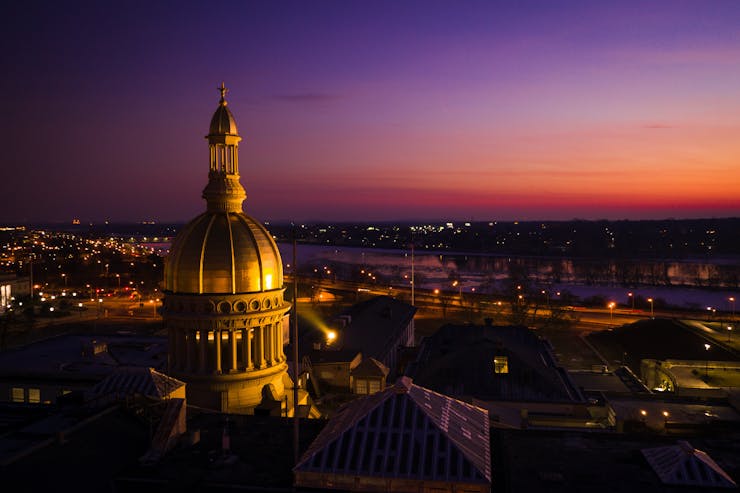New Jersey’s cannabis legislation is moving fast. The Garden State will soon allow recreational use and sales, joining 14 other states in America’s recent Green Rush.
The state’s passage of Question 2 in the Nov. 3 election legalized adult-use cannabis, but now it’s up to the Legislature to establish the detailed rules. Leafly went deep into the weeds of NJ’s 200-page bill and came away with the key takeaways you need to know before the scheduled December 17 vote.
According to its authors, The New Jersey Cannabis Regulatory, Enforcement Assistance And Marketplace Modernization Act was written to create a free and equitable cannabis market, while removing the plant from the statewide list of Schedule I drugs.
The bill considers everything from social justice provisions and minority business development to standard regulations for growers and distributors.
Here are five major takeaways:
1. New Jersey is using impact zones to prioritize restorative justice
New Jersey is prioritizing communities most hurt by the inequitable war on drugs. The bill’s high-population “impact zones” include Atlantic City, Camden, East Orange, Irvington, Newark, Paterson, Trenton, and other communities.

The bill requires that 25% of all legal cannabis licenses be awarded to residents who have lived in these zones, and that additional priority be given to businesses that hire residents of impact zones.
To qualify, an area must rank in the top 40% for recent small-amount marijuana possession arrests, the top 15% in unemployment, and have a crime index total of 825 or higher.
The bill also includes programs supporting microbusiness loans, conditional licenses, and business development resources that are exclusive to minority groups, women, and disabled veterans.
2. The Garden State is expecting a huge fiscal impact
Of the four states that voted to legalize recreational cannabis in November’s election, New Jersey’s ceiling for economic growth is likely the highest. Thanks to the Garden State’s nation-high population density and close proximity to major metropolitan areas like New York City and Philadelphia, the economy is ripe for a huge boost from recreational sales.
Shop highly rated dispensaries near you
Showing you dispensaries nearThe bill projects that revenue raised from the sale of marijuana will be in the hundreds of millions annually, and that’s before counting job creation, business growth, intellectual property development, and other boosts to local property and business values.

Of the 15 states that have approved recreational cannabis thus far, only California and Illinois are responsible for a larger share of the U.S. economy than New Jersey (3.9% of national GDP).
In recent years, states like Washington (rec-legal since 2014), Massachusetts (2016), and Michigan (2018) have seen a surge in tax revenues, small business growth, and tourism after allowing recreational cannabis use.
The example of those blooming economies across the nation, combined with the economic and social turmoil caused by COVID-19 was enough to push the high-contested bill over the line after years of detours.
3. A variety of licenses will present unique opportunities
Licensing structures will be in place from day one to ensure a competitive market emerges.
“Marketplace Modernization” was written into the bill’s name for good reason, and New Jersey is embracing the difficult task of rolling out a billion-dollar economy overnight.
For the first 18 months of the bill’s life, no business will be awarded a license for both growing and distributing cannabis. Additional restrictions against vertical integration will prevent the formation of premature monopolies.
Protections for cannabis handlers and the creation of legal consumption areas are two additional methods for promoting trust in communities along with safe and enjoyable use.
4. The Cannabis Regulatory Commission will call the shots

The New Jersey bill acknowledges that the current system of marijuana law enforcement is a failure for both social and financial reasons.
It states that NJ’s human and physical resources have been wasted on unjust laws that arrested Black and Brown residents at three times the rate of Whites for cannabis, despite similar usage. The collateral consequences of this decades-long failure include loss of access to secure employment, housing, student loans, and more.
To make sure that the state’s new path is centered on social justice, New Jersey’s Cannabis Regulatory Commission has been designated the decision-making authority for the state’s blossoming industry.
The Cannabis Regulatory Commission includes cannabis activists and experts who are invested in moderating a smooth and profitable transition for everyone involved. It is run by Dianna Houenou, former policy counsel to the ACLU of New Jersey.
5. Most regulations aim to protect kids and businesses
No surprises here. The majority of the bill’s prohibition measures are aimed at reducing minors’ access to cannabis while preventing gangs and cartels from entering the legal industry.
With estimates of $300 million in added tax revenue from first-year sales, the state’s education and law enforcement leaders should have more than enough resources to remix all of that classic D.A.R.E. content for a new generation.





